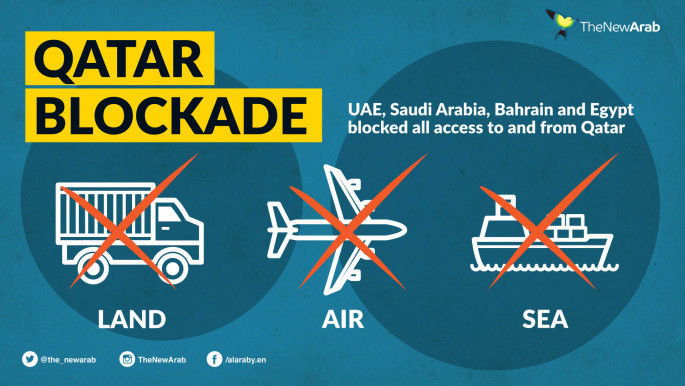Gulf blockade on Qatar 'causing rights abuses', says HRW
The isolation of Qatar by a Saudi-led bloc has resulted in serious human rights violations, Human Right Watch said on Wednesday.
The rights watchdog said the blockade was infringing on the right to free expression, separating families, interrupting medical care and education, and stranding migrant workers without food or water.
"Gulf autocrats' political disputes are violating the rights of peaceful Gulf residents who were living their lives and caring for their families," said Sarah Leah Whitson, Middle East director at Human Rights Watch.
"Hundreds of Saudis, Bahrainis, and Emiratis have been forced into the impossible situation of either disregarding their countries' orders or leaving behind their families and jobs."
On 5 June, Saudi Arabia and allied states cut all ties with Qatar, closing its only land border, banning planes from their airspace and barring Qatari nationals from passing through their airports.
They accused Qatar of supporting and funding "terrorism" and working with regional rival Iran - charges Doha vehemently denies.
The blockade has disrupted trade, split families and raised fears of military confrontation in the Gulf region.
Human cost
The measures against Qatar have taken their toll on Gulf families - including Saudis, Emiratis and Bahrainis - where one or more member is a Qatari citizen.
These families have been badly affected by the blanket ban on Qataris entering or remaining in Saudi Arabia, the UAE and Bahrain.
Mothers have been separated from their children and relatives unable to bury their dead due to the restrictions.
Qatari media reported that family members of a Saudi man who died in Qatar on 8 June could not enter to retrieve his body, and authorities eventually buried him in Qatar.
HRW interviewed and documented dozens of citizens from Qatar, Bahrain, and Saudi Arabia, as well as 70 foreign migrant workers living in Qatar.
One Qatari man said he was cut off from his pregnant Saudi wife, who was visiting family members in Saudi Arabia when the restrictions were imposed.
A Qatari woman said that she left her ailing 70-year-old Bahraini husband in Bahrain because her embassy advised her to return to Qatar.
A Bahraini woman virtually went into hiding to keep her government from discovering she had remained with her Qatari husband and two-month-old daughter, who is also a Qatari citizen.
 |
Gulf autocrats' political disputes are violating the rights of peaceful Gulf residents who were living their lives and caring for their families. - Sarah Leah Whitson |
 |
"Gulf countries need to take a step back and see the harm they are doing to their own citizens," Whitson said.
"Gulf countries should put people's well-being before their harmful power games."
One week into the crisis, following reports of family separations, the anti-Qatar Gulf countries announced they would establish hotlines and grant exceptions for "humanitarian cases of mixed families" for travel back and forth from Qatar.
However, of the 12 Gulf nationals who said they tried to contact these hotlines, only two managed to get permission to go back and forth, according to HRW.
Others said that they did not call because they worried that the three countries would use the hotlines to discover the identities of citizens who remained in Qatar.
Bahrain and the UAE have threatened to punish their own citizens for "expressing sympathy" for Qatar online.
Young Emirati activist Ghanem Abdullah Mattar was arrested last week after posting a video where he disparaged efforts to isolate Qatar.
His arrest came after a decree was issued by the UAE last month criminalising any expression of sympathy towards Qatar. Those convicted could face a fine of 13,500 US dollars and a prison sentence of 15 years.
Article 26 of the Arab Charter on Human Rights, which Saudi Arabia, Bahrain, and the UAE have ratified, prohibits arbitrary expulsion of foreigners and any collective expulsion.![Doha airport [Anadolu] Doha airport [Anadolu]](/sites/default/files/styles/image_345x195/public/media/images/4E7EC96E-59AF-4E91-BE9E-85A5A34CABD3.jpg?h=d1cb525d&itok=LfaS4iAK)



